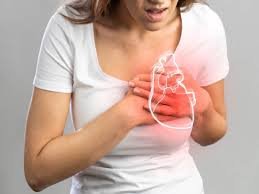New Delhi, 15 June 2025: Heart disease is often thought to strike suddenly with dramatic symptoms like crushing chest pain, but in many cases, the warning signs are subtle or even silent—especially in women, diabetics, and older adults. These quiet indicators are easy to ignore or misattribute to less serious conditions like fatigue, indigestion, or anxiety. However, ignoring these symptoms can delay diagnosis and lead to life-threatening events like heart attacks or heart failure. Cardiologists warn that understanding and recognising these lesser-known symptoms is crucial to catching heart disease early and saving lives.
1. Unusual Fatigue That Doesn’t Go Away
Persistent, unexplained tiredness—even after resting—can be one of the earliest signs of a struggling heart. If everyday activities such as climbing stairs or walking short distances suddenly feel exhausting, your heart may not be pumping efficiently enough to meet the body’s energy demands.
2. Shortness of Breath During Light Activity or Rest
If you find yourself gasping for air while performing tasks that never bothered you before, such as bending over, walking, or even lying down, this could point to heart failure. The heart’s inability to pump effectively leads to fluid buildup in the lungs, making it harder to breathe.
3. Indigestion, Nausea, or Stomach Pain
These digestive symptoms are often mistaken for acid reflux or food poisoning, but they can also signal heart trouble—especially in women. The nerves that trigger pain in the heart can overlap with those in the stomach, leading to confusing sensations.
4. Dizziness, Lightheadedness, or Fainting Spells
Feeling faint or dizzy could indicate low blood flow to the brain due to a weak heart, irregular heartbeat, or narrowed arteries. These symptoms should be urgently assessed, especially if they occur suddenly or repeatedly.
5. Pain in the Jaw, Neck, Shoulder, or Back
Not all heart-related pain is felt in the chest. Radiating pain or tightness in these areas—particularly on the left side—can be a red flag, especially if it comes on with exertion or is accompanied by other symptoms like sweating or nausea.
6. Irregular Heartbeat or Palpitations
A fluttering, racing, or skipped heartbeat can be a sign of arrhythmia or other heart abnormalities. While occasional palpitations are often harmless, frequent or prolonged episodes should not be ignored and warrant a medical evaluation.
7. Swelling in the Legs, Ankles, or Feet
When the heart cannot pump blood efficiently, fluid may collect in the lower limbs due to poor circulation. This swelling—also called edema—can also be a sign of kidney or liver issues but should never be dismissed without proper diagnosis.
8. Cold Sweats Without Physical Activity
Breaking out in a cold sweat unexpectedly, particularly when at rest or accompanied by other symptoms like pain or nausea, is a classic warning sign of a heart attack. It signals the body’s stress response to inadequate blood flow.
9. Sleep Disturbances or Sleep Apnea
Frequent waking, difficulty breathing during sleep, or loud snoring may indicate sleep apnea, which is linked to high blood pressure and an increased risk of heart disease. Interrupted sleep deprives the heart of adequate oxygen and rest, compounding cardiovascular risk.
While loud, crushing chest pain gets the most attention, heart distress often begins with whispers—subtle signs that something isn’t right. Paying attention to these silent symptoms and acting early can prevent serious complications and even save lives. Regular health check-ups, a heart-healthy lifestyle, and timely medical attention for anything unusual can go a long way in protecting your heart. If your body is sending signals, don’t ignore them—your heart might be in distress.







